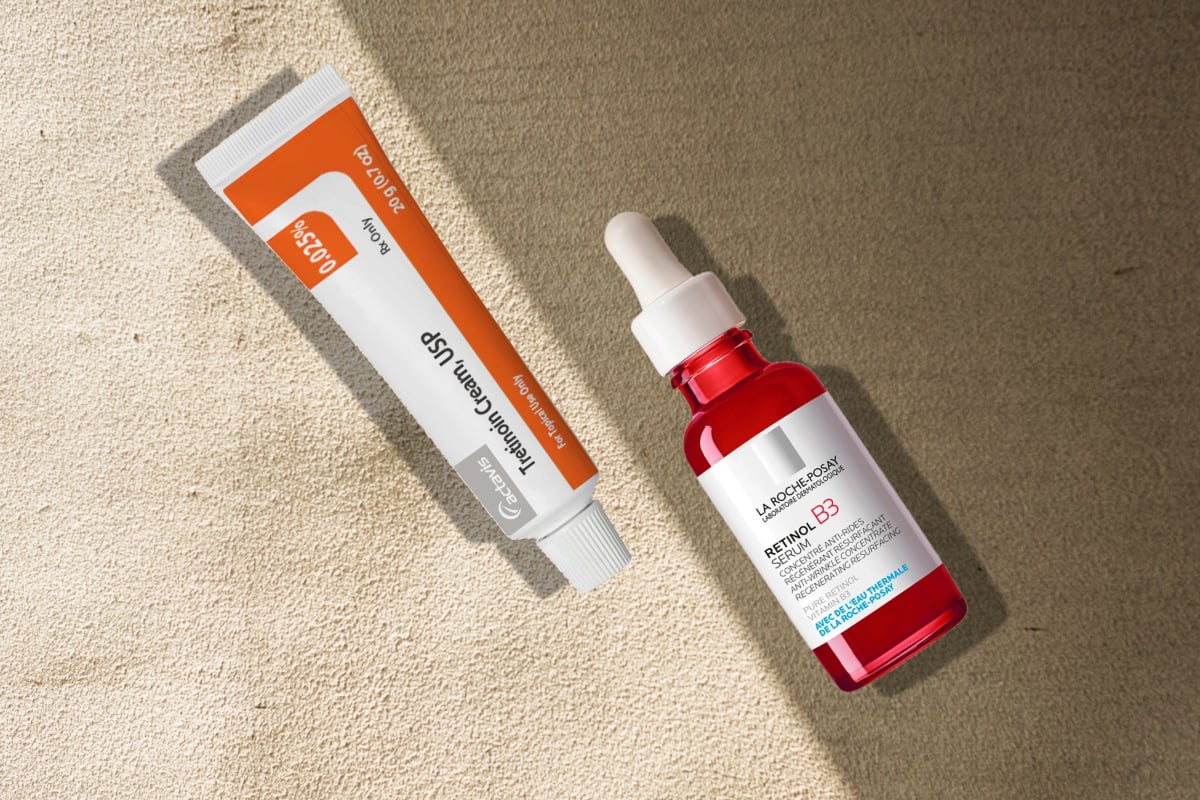Vitamin A products are top tier in the skincare world. Want to reverse aging and promote collagen? Need to clear pigmentation? Are you fed up with acne? There’ll be a retinoid for that! But it can get confusing to know which product type to choose. So, what better than a showdown between two major contenders: granactive retinoid and retinol. Both will provide the results you need, but which does it more effectively, and which should you choose?
Grab the popcorn: it’s getting skincare feisty in here. Granactive retinoid vs. retinol, FIGHT!
What is retinol?
I know you’ll most likely have heard of retinol. It’s been around for decades and has become one of those giant skincare buzzwords— for good reason. Retinol is a form of vitamin A you’ll see in all kinds of skincare products. The results? A time machine for your face.
Picture skin cell turnover on steroids! This creates the potential for reduced signs of aging, fainter scars, and smoothed imperfections. And because it removes the build-up of dead skin cells on your face, your skin can actually get more hydration in too. Possible miracle worker? I think so!
What is granactive retinoid?
Here’s a heads up for you, granactive retinoid is actually a trade name. Its actual name is hydroxypinacolone retinoate (HPR), but come on, that’s just a tad too sciency. Granactive retinoid is a newer generation on the vitamin A family tree with fewer studies behind it. But trust me, it’s deserving of this post!
The potential skin-care effects of using granactive retinoid are in the same class as retinol — improved skin cell turnover to keep your skin looking younger and clearer. So basically, granactive retinoid works the same way as retinol to increase cell proliferation, stimulate collagen production and thicken the skin.
However, it has been demonstrated that granactive retinoid is more stable and causes less skin irritation than retinol because it doesn’t have to undergo the same conversion steps as retinol to get into the active form of vitamin A (retinoic acid).[1] As such, granactive retinoid has emerged in skincare formulations as an effective alternative to retinol and other harsh or less potent retinoids.
Granactive Retinoid vs. retinol
That being said, there are definite differences between granactive retinoid and retinol — on with the main event! To figure out who comes out on top in the fight between granactive retinoid vs. retinol (puttem’ up!), you should know the differences between the two:
Granactive retinoid is working faster
We live in a world of people who want results ASAP. Sadly, neither of these two will make your lines or acne disappear overnight. But there is a difference in how quickly granactive retinoid vs. retinol will get to work on your skin cells.
Retinol is effective with its results, but it’ll make you wait for them. The product slowly breaks down and converts to retinoic acid before it fully works. This process varies from skin to skin, but you could be waiting at least three-four months, which is a long time when we just want to wake up with flawless skin in the morning.
Compared to retinol, granactive retinoid couldn’t be more different. Once on your skin, granactive retinoid immediately gets to work because it’s more active and doesn’t need to be broken down in the same way. So, you could see results within six weeks!
Studies have actually confirmed that granactive retinoid is both very effective and safe in treating moderate acne, hyperpigmentation, dark spots, and photoaging, providing the first noticeable improvements anywhere between four to eight weeks.[3][4][5]
Granactive retinoid is gentler on the skin
Both granactive retinoid and retinol cause quicker skin cell turnover. This means that for a little bit, more dead cells will be sloughed off of your face, and it takes time for the new cells to get to the surface. This exposure can show up on your skin as irritation.
And to a certain extent, slight redness or some dryness is normal when using retinoids and won’t do long-lasting harm, especially not when you combat it with the rest of your skincare routine.
So here comes the next difference between retinol and granactive retinoid: granactive retinoid is working gentler on the skin compared to retinol. This is because of that breaking down process it goes through. Since granactive retinoid is already active and doesn’t need to break down, it carries less irritation risk.[2]
Either way, it’s always recommended that you start with the lowest percentage of vitamin A products and slowly build up strength. This way, you can avoid irritation.
The all-important shelf life
Here’s a fact for you: vitamin A products are fussy. They’ll work super hard for you, but they need special care. Pretty much all forms of retinoids hate light. That’s why you see them housed in dark bottles. And they also can struggle with warmer temperatures.
When they get exposed to these things, they expire faster. This is sad because you want to get your money’s worth out of your skincare. And skincare that has a short shelf-life doesn’t work well with your purse strings. However, compared to retinol, granactive retinoid lasts longer. In fact, studies have shown that it’s the longest-lasting of all retinoids too! You can even keep it in your toasty bathroom because heat doesn’t affect it too much. However, it doesn’t like light.
Sadly, in comparison, retinol is superbly fussy. It hates warm temperatures, and it hates the light. You’re actually best off popping it in the fridge. I love looking in my fridge for snacks, but it’d definitely interrupt my nighttime regimen. It’ll probably last you six months tops, too, so get using!
Is granactive retinoid better than retinol?
Now that you know the differences between granactive retinoid and retinol, your next question is probably which one is better, right?
You may have gathered this, but all signs point toward granactive retinoid being superior to retinol. It’s not that retinol isn’t effective because it 100% is, and it’s still incredibly popular all across the globe, but it’s like the grandma of that vitamin A family tree. We trust it. We love it. However, it’s not down with the kids!
Granactive retinoid learned from its elders and evolved to avoid those past issues. Compared to retinol, you’re getting less skin irritation, quicker results, and longer shelf life with granactive retinoid. Amen to that! As with every skincare ingredient and product, we’re all going to have different experiences and preferences. Even though granactive retinoid came out trumps here, it doesn’t mean that retinol won’t work better for you in the long run. The journey is yours!
The takeaway
Granactive retinoid is definitely on the rise in the skincare world, and most probably, it will take a good part of the fame of retinol and other retinoids in the near future.
The only drawback of granactive retinoid at the moment is that it’s not fully proven yet, and the research going into its skin benefits is far from conclusive. However, that will not last forever as I’m sure more researchers have got this ingredient in their spotlight.
- Antiaging effects of retinoid hydroxypinacolone retinoate on skin models, Journal of the American Academy of Dermatology, Volume 79, Issue 3, Supplement 1, 2018, Page AB44, ISSN 0190-9622, https://doi.org/10.1016/j.jaad.2018.05.215.
- Pérez Davó A, Truchuelo MT, Vitale M, Gonzalez-Castro J. Efficacy of an Antiaging Treatment Against Environmental Factors: Deschampsia antarctica Extract and High-tolerance Retinoids Combination. J Clin Aesthet Dermatol. 2019;12(7):E65-E70.
- Clinical evaluation of the efficacy of a new retinoic-complex (Retinsphere®) product for the treatment of skin photoaging. Cameli N., Mariano M., Abril E., Berardesca E.
- Veraldi S, Barbareschi M, Guanziroli E, Bettoli V, Minghetti S, Capitanio B, Sinagra JL, Sedona P, Schianchi R. Treatment of mild to moderate acne with a fixed combination of hydroxypinacolone retinoate, retinol glycospheres, and papain glycospheres. G Ital Dermatol Venereol. 2015 Apr;150(2):143-7. PMID: 25876142.
- Truchuelo MT, Jiménez N, Jaén P. Assessment of the efficacy and tolerance of a new combination of retinoids and depigmenting agents in the treatment of melasma. J Cosmet Dermatol. 2014 Dec;13(4):261-8. doi: 10.1111/jocd.12110. PMID: 25399618.




![Does resveratrol in red wine benefit your skin? While sipping on a glass of red wine can be a delightful experience, relying on it for skincare benefits is not the best idea. Sure, red wine contains a smidge of resveratrol, but let's put things into perspective. The concentration of resveratrol in red wine is relatively low. Red wines, specifically Pinot noir from France, typically contain 0.361-1.972 mg of resveratrol per liter.[8] To hit that reference dose of 500mg of resveratrol, you'd need to drink a lot of wine. We're talking about downing anywhere from 100 to 1000 glasses per day. It's a scene straight out of a wine lover's wildest dreams, but definitely not the healthiest approach. Resveratrol Benefits for Skin](https://womensconcepts.com/wp-content/uploads/2022/03/Resveratrol-Benefits-for-Skin.jpg)
